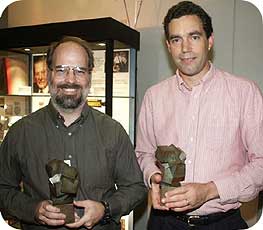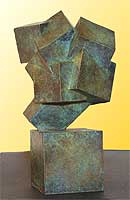ADC Innovations Honored with Oliver Prize
|
|
February 10, 2003
The 2002 Barney Oliver Prize was awarded to Ken Poulton and Robert Neff for their innovative work in designing the world's fastest analog-to-digital converters (ADC). The team developed two breakthrough chips used in Agilent's mid-range and high-end oscilliscopes. Their first design set records for the lowest ADC power/sample-rate figure-of-merit, and highest effective bits at 1GHz signal frequency. Their next-generation chip established records for highest clock rate (20 GHz) and highest bandwidth (6 GHz) ever reported for a monolithic ADC. The technology provides performance breakthroughs for research and development engineers in the computer, communications, and semiconductor industries who use the products for validating and verifying the performance of new high-speed digital product designs.
Award History Oliver joined HP in 1952 as Director of Research before founding the Labs in 1966 and serving as its first Director until his retirement in 1981. He passed away in 1995. Last year, the prize was awarded to the team of Rich Ruby, John Larson, and Paul Bradley for their "groundbreaking research that led to the development of a commercially viable FBAR (Film Bulk Acoustic Resonator) family of products." In 2000, the Oliver Prize went to Julie Fouquet and David Donald won for their innovative optical cross-bar switch, the Champagne Bubble Switch, which allows for a high-speed all-optical network. In 1999, Agilent's Gary Gordon was awarded the Joel Birnbaum Prize -- the predecessor to the Oliver Prize before Agilent spun off from HP -- for inventing and championing gestural encoders and various optical mice, which promise to change fundamentally the way we interact with our entertainment centers and computers."
Related Information |

